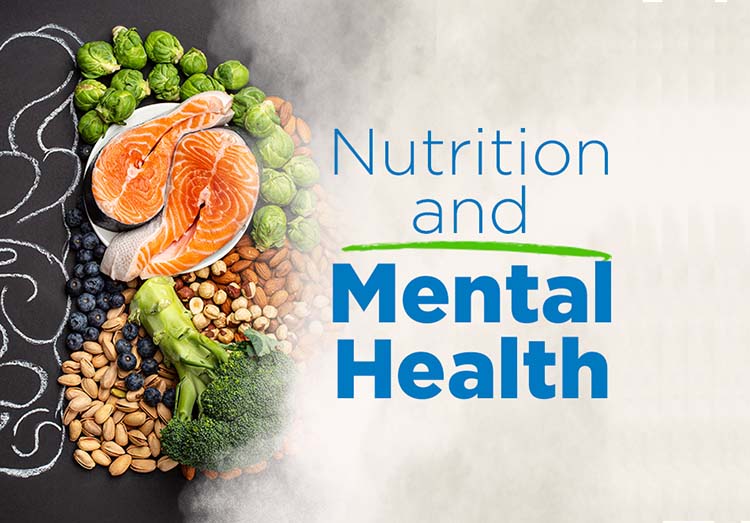The impact of nutrition on our physical health is well-known, but its influence on mental health is often overlooked. However, scientific research has shown that there is a strong connection between nutrition and mental well-being. In this blog post, we will explore the link between nutrition and mental health, highlighting the importance of a healthy diet in supporting optimal mental well-being.
The Gut-Brain Axis:
- The Gut-Brain Connection: The gut and the brain are intricately connected via a bidirectional communication system known as the gut-brain axis. The gut microbiota, or the trillions of microbes residing in our intestines, play a crucial role in this connection.
- Microbiome and Mental Health: Emerging evidence suggests that the composition and diversity of the gut microbiome can influence neurotransmitter production, brain development, stress response, and mental health.
Nutrients for Mental Health:
- Omega-3 Fatty Acids: Omega-3 fatty acids, found in fatty fish, walnuts, and flaxseed, have been linked to reduced symptoms of depression, anxiety, and other mental health disorders.
- B Vitamins: B vitamins, including folate, B6, and B12, are essential for neurotransmitter synthesis and maintaining optimal brain function. Deficiencies in these vitamins have been associated with an increased risk of depression and cognitive decline.
- Antioxidants: Antioxidants, found in fruits, vegetables, and nuts, protect the brain from oxidative stress and inflammation, which can contribute to mental health disorders.
- Amino Acids: Amino acids, derived from protein-rich foods, serve as building blocks for neurotransmitters such as serotonin and dopamine, which regulate mood and emotions.
The Impact of Unhealthy Diets on Mental Health:
- Inflammatory Diet: Diets high in processed foods, added sugars, unhealthy fats, and low in fruits, vegetables, and whole grains can promote chronic inflammation, which is associated with an increased risk of depression and other mental health disorders.
- Nutrient Deficiencies: Poor nutrition from a diet lacking in essential nutrients can impair brain function and increase the risk of mental health disorders.
- Blood Sugar Imbalances: Diets high in refined carbohydrates can cause rapid fluctuations in blood sugar levels, leading to mood swings, fatigue, and irritability.
The Role of Diet in Specific Mental Health Disorders:
- Depression and Anxiety: Several studies have shown that adherence to a Mediterranean-style diet, rich in fruits, vegetables, whole grains, lean proteins, and healthy fats, is associated with a decreased risk of depression and anxiety.
- Attention Deficit Hyperactivity Disorder (ADHD): Some research suggests that diets high in processed foods, artificial additives, and sugar may increase ADHD symptoms, while diets rich in whole foods and nutrients like omega-3 fatty acids may be beneficial.
- Alzheimer’s Disease: Diets high in antioxidants, omega-3 fatty acids, and a variety of fruits and vegetables have been associated with a reduced risk of cognitive decline and Alzheimer’s disease.
Practical Tips for Promoting Mental Well-being through Nutrition:
- Focus on Whole Foods: Prioritize whole, unprocessed foods such as fruits, vegetables, whole grains, lean proteins, and healthy fats in your diet to ensure an adequate intake of essential nutrients.
- Increase Omega-3 Intake: Incorporate fatty fish (like salmon and sardines), flaxseeds, chia seeds, and walnuts into your diet to boost omega-3 fatty acid levels.
- Stay Hydrated: Drink plenty of water throughout the day, as dehydration can affect mood and cognitive function.
- Limit Sugar and Processed Foods: Reduce consumption of sugary snacks and processed foods, as they can negatively impact mental health and contribute to inflammation.
- Consider Probiotics: Consuming probiotic-rich foods like yogurt and fermented vegetables or taking a probiotic supplement can help support a healthy gut microbiome.
Conclusion:
The connection between nutrition and mental health is increasingly recognized as a vital aspect of overall well-being. A diet rich in nutrients such as omega-3 fatty acids, B vitamins, antioxidants, and amino acids can support brain function, neurotransmitter synthesis, and reduce the risk of mental health disorders.
Conversely, poor nutrition from unhealthy diets can promote inflammation, nutrient deficiencies, and imbalances that contribute to mental health issues. By prioritizing a balanced and nutrient-rich diet, we have the power to nourish our bodies and minds, promoting optimal mental well-being and improved quality of life. Remember, food is not only fuel for our bodies but also an essential component in nurturing our mental health.

